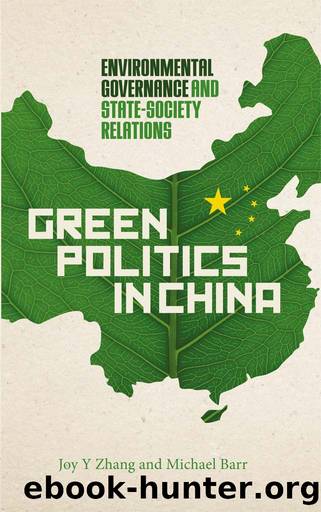Green Politics in China: Environmental Governance and State-Society Relations by Joy Yueyue Zhang & Michael Barr

Author:Joy Yueyue Zhang & Michael Barr [Zhang, Joy Yueyue & Barr, Michael]
Language: eng
Format: epub
Tags: Public Policy, Political Science, Asia, History, Environmental Policy, China, General
ISBN: 9780745333007
Google: M06PMAEACAAJ
Goodreads: 17368977
Publisher: Pluto Press
Published: 2013-06-06T00:00:00+00:00
Open Information and the Silent Apple
Over the first decade of the 21st century, southern China increasingly became a global hub for manufacturing branded IT products for major internationals such as Apple, Nokia and Dell. IT product factories are known to be big polluters. They use gases which act as irritants, presenting possible health hazards for local populations. They also make use of heavy metals (for example copper, nickel and lead) whose waste discharge at levels over the authorised standards can cause severe water and soil pollution. A common phrase in Chinese is âtrash vegetablesâ (laji cai), referring to vegetation that has a high heavy metal content which could potentially lead to chronic intoxication, cancer and birth defects (J. Liu, 2012).
Chinese ENGOsâ collective action against industrial illegal dumping was closely connected to one particular government reform: the political resolution to provide better public disclosure. Government information is often kept from the public for fear that it will be misused, because of its claimed irrelevance, or because its disclosure might cause political unrest. However, in the first decade of the 21st century, as an effort to increase government transparency, the State Council introduced the Regulation of the Peopleâs Republic of China on the Disclosure of Government Information, which took full effect on May 1, 2008 (State Council, 2007). In responding to this new political initiative, Chinaâs environment authority, the then State Environmental Protection Administration (now the MEP), was among the first to set out specific disclosure rules. The Measures for the Disclosure of Environmental Information (for Trial Implementation) were enacted on the same day (State Environmental Protection Administration, 2007). This provided a legal mandate for both government bureaus and enterprises to release environmental information. Chinese ENGOs as well as the mainstream media were keen to follow the enforcement of these new rules (Hu, 2010).
Moreover, ENGOs did not limit their actions to trying to ensure that the government kept its promises, but incorporated this new government commitment into their own agendas. For example, the leading ENGO in Beijing, the Institute of Public and Environmental Affairs (IPE), had been collecting publicly available data for years as part of its attempt to map out and trace water pollution sources.19 The promulgation of the new open information regulation in 2008 largely extended its capacity for independent pollution monitoring. In a 40-minute special on Chinaâs Central Television, the director of IPE recounted that in 2009, IPE had turned its attention to heavy metal pollution. On basis of the records it had collected, IPE affirmed that illegal dumping by IT manufacturers was an increasing threat to the Chinese soil. On a closer examination, IPE further identified that most of these factories were suppliers to international brands.20
Conventionally, illegal discharge was often considered to lie within the vertical power relations between local government and the manufacturer in question. Yet increasingly the survival of manufacturing facilities depended not only on local approval but also on their performance and competitiveness within a horizontal supply chain. Thus it seemed that a more effective
Download
This site does not store any files on its server. We only index and link to content provided by other sites. Please contact the content providers to delete copyright contents if any and email us, we'll remove relevant links or contents immediately.
| Anthropology | Archaeology |
| Philosophy | Politics & Government |
| Social Sciences | Sociology |
| Women's Studies |
The Secret History by Donna Tartt(19053)
The Social Justice Warrior Handbook by Lisa De Pasquale(12187)
Thirteen Reasons Why by Jay Asher(8894)
This Is How You Lose Her by Junot Diaz(6877)
Weapons of Math Destruction by Cathy O'Neil(6267)
Zero to One by Peter Thiel(5787)
Beartown by Fredrik Backman(5737)
The Myth of the Strong Leader by Archie Brown(5500)
The Fire Next Time by James Baldwin(5431)
How Democracies Die by Steven Levitsky & Daniel Ziblatt(5216)
Promise Me, Dad by Joe Biden(5144)
Stone's Rules by Roger Stone(5081)
A Higher Loyalty: Truth, Lies, and Leadership by James Comey(4954)
100 Deadly Skills by Clint Emerson(4921)
Rise and Kill First by Ronen Bergman(4780)
Secrecy World by Jake Bernstein(4741)
The David Icke Guide to the Global Conspiracy (and how to end it) by David Icke(4709)
The Farm by Tom Rob Smith(4502)
The Doomsday Machine by Daniel Ellsberg(4484)
